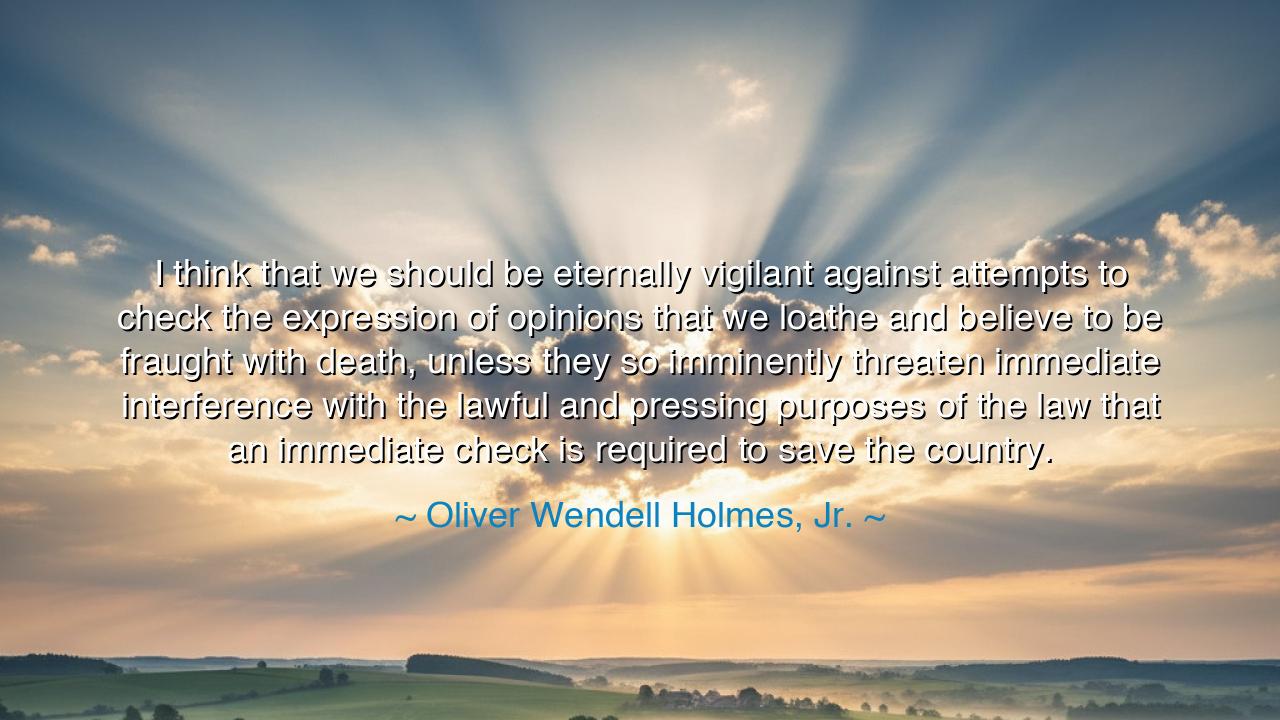
I think that we should be eternally vigilant against attempts to
I think that we should be eternally vigilant against attempts to check the expression of opinions that we loathe and believe to be fraught with death, unless they so imminently threaten immediate interference with the lawful and pressing purposes of the law that an immediate check is required to save the country.






“I think that we should be eternally vigilant against attempts to check the expression of opinions that we loathe and believe to be fraught with death, unless they so imminently threaten immediate interference with the lawful and pressing purposes of the law that an immediate check is required to save the country.” Thus spoke Oliver Wendell Holmes, Jr., the great justice of the United States Supreme Court, whose mind was as tempered as steel and whose heart burned with a philosopher’s regard for liberty. His words, born of wisdom and battle, express the paradox at the heart of freedom—that to preserve truth, one must protect even the right of falsehood to speak. In this single statement, Holmes bequeaths to the generations a commandment of democracy: that the freedom of speech must endure not because it is easy, but because it is the hardest of all freedoms to defend.
The origin of this quote lies in the aftermath of the First World War, in the case of Abrams v. United States (1919). The young nation was fearful, its spirit shaken by revolution abroad and dissent at home. The government sought to silence those who criticized the war or questioned authority, branding them as traitors. Holmes, who had himself fought and bled in the Civil War, understood both the cost of national unity and the sanctity of individual conscience. In his dissenting opinion, he argued that unless a speech posed a clear and present danger—an imminent threat to lawful order—it should not be stifled. For Holmes, the true strength of a free nation lies not in uniformity of thought, but in its willingness to allow all ideas, even those we loathe, to contend in the open air of reason.
These are not the words of naïve tolerance, but of hard-won wisdom. Holmes, a man scarred by battle, knew the power of belief and the peril of ideology. He recognized that truth, if it is to endure, must be tested by challenge, by opposition, even by falsehood. To silence the hateful voice is to grant tyranny the first victory. For once the sword of censorship is drawn, it never rests; it turns in time against all. Thus he called for eternal vigilance, not merely against enemies from without, but against the subtler enemies within—the fear, the anger, and the pride that tempt men to silence others. Freedom dies not in a single act, but by degrees, each justified by a sense of righteousness.
The ancients, too, knew this truth. In the golden age of Athens, the philosopher Socrates was condemned to death not for treason or violence, but for words—words that questioned, provoked, and unsettled. The city that had once prided itself on liberty became its own executioner, killing the man who had taught it to think. In that tragedy lies the eternal warning Holmes sought to preserve: that the suppression of speech, however noble its pretense, corrodes the very soul of freedom. Every generation must therefore choose whether it will silence its critics or strengthen itself through their challenge.
History, again and again, reveals that when nations yield to fear and silence dissent, they descend into darkness. The Inquisition burned heretics to save souls. Revolutions silenced moderates to preserve purity. Tyrants censored thought to preserve order. And yet, in each age, it was those who dared to speak—to defy the comfortable lie—who became the architects of progress. Holmes’ words remind us that liberty cannot survive if it is only for the agreeable. A free people must have the courage to tolerate speech they despise, for the power to silence one voice today is the power to silence all tomorrow.
This is no easy lesson. To defend the speech of those who offend us is to confront our own passions and pride. It requires humility to admit that truth does not need protection, but discovery. Holmes challenges us to trust not in censorship, but in reason; not in force, but in dialogue. His wisdom is not that all speech is good, but that freedom itself is greater than the good or evil of any single utterance. The marketplace of ideas, he believed, will in time expose falsehood, as light banishes shadow. But that light must be free to shine.
Therefore, my friends, learn from Oliver Wendell Holmes, Jr. and his solemn counsel: guard with vigilance the right to speak—even for those whose words offend your soul. Be wary of the temptation to silence; for every time you crush a voice, you weaken the ground beneath your own. Let truth, not authority, be your shield. Let reason, not fear, be your guide. In your homes, in your discourse, in your governance, practice the art of listening even when the words burn in your ears. For the health of a nation, like the strength of the human spirit, depends upon its ability to endure disagreement without destruction.
And so, as Holmes taught, let us remain eternally vigilant—against tyranny, yes, but more importantly against ourselves. For freedom is not lost in a single moment of violence; it perishes in silence, when good men decide that some opinions are too dangerous to hear. Guard that silence as you would guard your breath. For once the voice of liberty falters, no law can restore it—and no prayer can bring it back.






AAdministratorAdministrator
Welcome, honored guests. Please leave a comment, we will respond soon